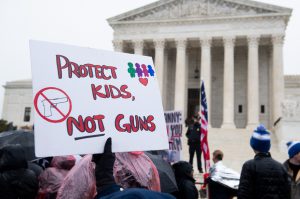Wednesday, November 3rd, saw the start of a pivotal Supreme Court hearing of a case against state gun restrictions. The case stems from the current New York law that requires people to demonstrate a “special need for self-protection from that of the general community” when applying for a concealed carrier permit, for which two private citizens were recently denied. Said citizens have since launched into action as they sue the state in violation of second amendment rights alongside the New York State Rifle and Pistol Association.
Currently, New York is only one of several states whose gun control laws are vulnerable in the face of a Supreme Court decision, as California and several East Coast states also practice restrictive permit approvals, in that they are issued only in instances of strong “proper cause”.

Gun safety advocates protest outside Supreme Court building. SAUL LOEB/AFP/Getty
These regulations sprouted in response to rising gun violence in the past few decades and especially since the 2018 Parkland school shooting, many challenges to which have been rebuffed by the Supreme Court in the past year. Therefore, the justices’ decision to take up the New York case has legal experts expecting them to impose a more stalwart stance on the controversial issue.
Additionally, while the court’s more recent firearm decision in 2008 guaranteed the individual right to a handgun in the home, the upcoming ruling has many anticipating an expansion on gun rights outside the home due to the conservative-heavy court.
The Biden Administration and gun control groups have since voiced opposition at an attempt to weaken the New York legislation, both arguing that gun control should remain a state decision and that “sensible restrictions” effectively curb violence in densely populated areas, according to an amicus brief issued by The March For Our Lives (MFOL) organization.
This is just one of over 80 briefs that have been submitted from advocates on both sides regarding the decision, which turns out to be more than just a left versus right issue.
Specifically, many citizens have expressed frustration at the difficult endeavor that is obtaining a concealed carrier permit in New York state, spurring many similar second amendment cases in the past decade.
One such case was declined by the Supreme Court in 2013, which spawned when a transwoman was denied a permit because a concern for her personal safety due to her identity didn’t make the cut.
“It’s an impossible standard for the average person to meet” Cato Institute V.P. Ilya Shapiro, who also issued an amicus brief, told TIME. “You can’t get it unless you’re a celebrity, retired law enforcement, or have like 17 credible and detailed death threats against you.”
Additionally, Shapiro argues that the “proper cause” is entirely too subjective, creating disparity between licensing decisions and granting officials too much power.
21 states currently exhibit specific grounds for which a permit can be denied, while 21 others have no application process at all for carrying a gun in public. But as the process of ruling unfolds, change is expected across all state-fronts.